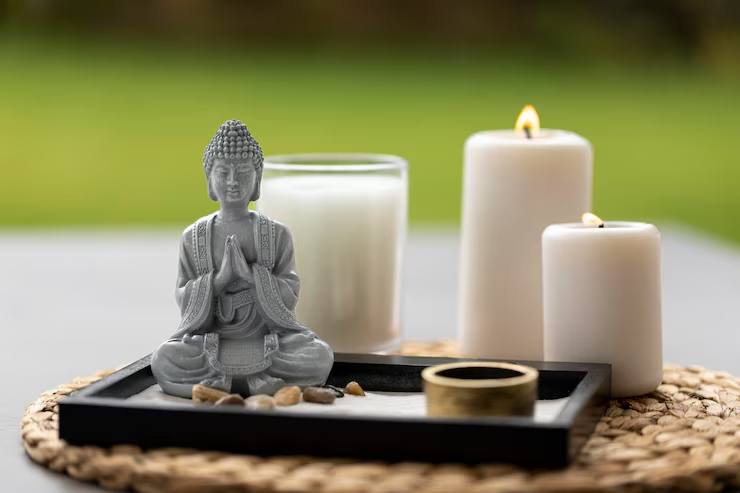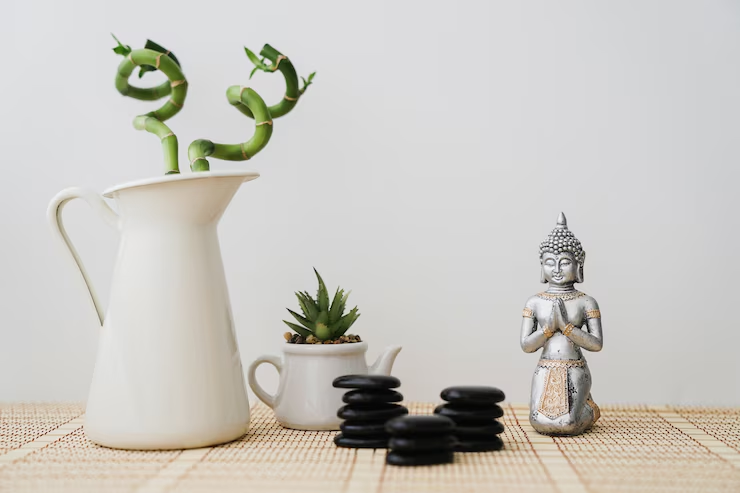For as long as I can remember, I’ve believed that our environments shape us more than we realize. Whether it’s the cozy corner where I read every morning or the way sunlight filters through the windows in the afternoon, every part of a space carries energy. That’s why I turned to Feng Shui, not just an aesthetic guideline but a philosophy that helps create harmony, flow, and balance.
Feng Shui, an ancient Chinese art, teaches us that by mindfully arranging our surroundings, we can invite prosperity, peace, and good fortune into our lives. Over time, I’ve integrated several Feng Shui principles into my own home, and I’ve seen subtle yet powerful changes in my well-being, relationships, and even my luck.
Let me talk you through seven key Feng Shui tips that have helped me cultivate a more harmonious space. These aren’t just theories, they’re practices I’ve lived and breathed, and I believe they can help transform your space, too.

Start With the Entrance: Your Home’s First Impression Matters
The front entrance, often called the “mouth of chi,” is where energy enters the home. In Feng Shui, it’s believed that if the entrance is blocked, dirty, or cluttered, positive energy can’t flow in. I used to overlook this part of my home entirely, thinking it was just the space between the outside world and my living room. But once I started paying attention to it, I noticed a difference in how welcoming my home felt to others and to myself.
Now, I keep my entryway clean, well-lit, and free of unnecessary items. I added a welcoming mat, a healthy potted plant, and a small mirror on the side wall to reflect good energy inward. Since making these changes, I feel a stronger sense of grounding and ease every time I step through the door. It’s like the house is greeting me, not just sheltering me.
Clear the Clutter: Make Room for Fresh Energy
Clutter used to be my constant companion. From piles of unopened mail to unused gadgets gathering dust, I didn’t realize how much stagnant energy I was inviting into my life. Feng Shui places a strong emphasis on the importance of decluttering because stagnant items block energy flow and trap us in old patterns.
When I finally committed to clearing out what I didn’t need, I wasn’t just making space in my home, I was making space in my mind. I tackled one area at a time, letting go of things that didn’t serve a purpose or bring joy. It wasn’t just a physical process because it was deeply emotional and even spiritual at times. And the result? More light, more movement, and a palpable sense of relief. I could finally breathe in my own space again.
Use the Five Elements to Create Balance
Feng Shui revolves around five natural elements: wood, fire, earth, metal, and water. Each element represents different kinds of energy and plays a role in creating harmony. At first, I found this a little abstract, and I kept asking myself how do I know if my home has “enough metal” or “too much fire”? But once I understood the symbolism behind each element, it started to click.
I introduced the wood element through plants and wooden furniture, which encouraged growth and vitality. Fire came in from the candles and warm lighting, which brought passion and energy. Earth was added with ceramics and stones, grounding the space. Metal, symbolizing clarity and precision, showed up in fixtures and framed mirrors. And water flowed through the use of glass, blue tones, and even a small tabletop fountain.
When all five elements are present, I feel more balanced emotionally and mentally. If a room feels off, I now instinctively look for what element might be missing or overpowering the others.
Position Your Bed and Desk With Care
One of the most transformative Feng Shui changes I ever made was repositioning my bed. I had no idea its placement could affect my sleep and sense of security so profoundly. According to Feng Shui, the bed should be in the command position. This means that the bed should face the door but shouldn’t be directly in line with it. This position gives a subconscious sense of safety and control.
Once I moved my bed to align with this principle, I started sleeping more deeply. It felt less anxious and more well-rested, almost as if my body could finally relax knowing it was protected in the right space.
I applied the same principle to my desk. I used to work with my back to the door, which made me feel uneasy and distracted. Now, with my desk positioned so I can see the entrance to the room, I feel more empowered and focused. It’s a small shift, but it’s made a big difference in my productivity and creativity.
Mind the Mirrors: Reflect What You Want to Multiply
Mirrors are powerful tools in Feng Shui, but they must be used thoughtfully. I used to hang mirrors wherever I thought they’d make a room look bigger, without considering what they were reflecting. But in Feng Shui, mirrors are seen as amplifiers because it is believed they double whatever energy they reflect.
Once I learned this, I started being more intentional. I made sure mirrors didn’t face clutter or sharp corners. Instead, I positioned them to reflect natural light or beautiful views. In the dining room, a mirror that reflects the table is said to multiply abundance and togetherness, something I’ve found to be true in both subtle and surprising ways.
However, I also learned to avoid placing mirrors directly opposite beds or doors. In some interpretations of Feng Shui, this can disturb sleep or lead to restlessness. Since moving a mirror that once faced my bed, I’ve felt a deeper sense of rest and calm during the night.
Color With Purpose: Let Every Shade Speak
Color is one of the most intuitive and accessible tools in Feng Shui. Each color corresponds to one of the five elements and carries its own energy. I used to pick colors based purely on trends or personal preference, but now I approach color choices with intention.
In spaces where I want to relax, like the bedroom, I lean into earthy tones and soft blues, which promote calm and rest. For areas where I want more activity and interaction, like the kitchen or living room, I incorporate reds, oranges, and yellows to encourage warmth and connection.
Even small touches, like a vibrant cushion or a painted accent wall, can shift the mood of a room. I love experimenting with color because it’s such a personal way to align your space with how you want to feel. And unlike structural changes, colors are easy to adjust as your energy and seasons of life change.

Invite Nature Inside: Plants, Light, and Flow
Nature has an incredible way of healing and balancing us. Feng Shui encourages us to bring elements of nature into our homes not only for beauty but also for their energetic benefits. I started with a few low-maintenance plants like a snake plant and a peace lily. They brought life and freshness into spaces that felt dull and uninspired.
Natural light became another focus. I used to keep the blinds closed out of habit, but when I began opening them every morning, my entire mood lifted. Rooms bathed in natural light feel more alive, and the energy feels more uplifting.
I also learned to consider how energy flows around obstacles. A house full of beautiful objects still feels off if you’re constantly bumping into things or if the layout feels cramped. I now aim for open pathways that allow energy to move freely from room to room. When energy can flow, so can good fortune.
If you want to learn more about Feng Shui and its principles, here’s a cool book you can read.
If you liked this article, here’s what to read next: Over 60? You Should Avoid These 9 Decor Mistakes